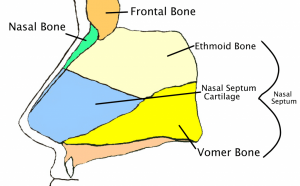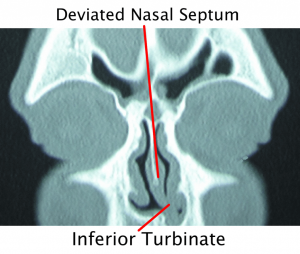Your path to breathing better begins here: Solve your deviated septum issue
Are you experiencing difficulty breathing through your nose? It might be symptoms of a condition called Deviated Septum, à deviation in your nasal pathways that can cause breathing issues and more. Dr. Mourad specializes in nasal conditions and their treatments, and offers deviated septum surgery (septoplasty) in New York City.
Relieve your breathing problems with septoplasty in NYC – Meet with Dr. Mourad
Septoplasty Procedure to Improve the Nasal Passages
Septoplasty, a surgical procedure focused on correcting deviated septum issues, aims to optimize the nasal airway. This outpatient procedure involves adjusting the cartilage and bone, enhancing the nasal structure and potentially alleviating symptoms such as nasal obstruction, pain, and breathing difficulties.

How Can Dr. Mourad Improve my Quality of Life with Deviated Septum Surgery?
Most patients who come into our office have been on all of the medications (nasal steroid sprays, decongestants or antihistamines) and may still not breathe well. We will discuss all the options for treatment with you. We feel that educated patients are happier and more realistic about their treatment. Our office will check your benefits and deal with insurance as much as possible. Dr. Mourad is an expert at all forms of nasal surgery and is happy to discuss your care with you. Please let us know how we can help you.
Do I Need a Septoplasty?
How Can Dr. Mourad Improve my Quality of Life with Deviated Septum Surgery?
Most patients who come into our office have been on all of the medications (nasal steroid sprays, decongestants or antihistamines) and may still not breathe well. We will discuss all the options for treatment with you. We feel that educated patients are happier and more realistic about their treatment. Our office will check your benefits and deal with insurance as much as possible. Dr. Mourad is an expert at all forms of nasal surgery and is happy to discuss your care with you. Please let us know how we can help you.
Whether you need a septoplasty depends on whether you have a deviated septum that’s causing health issues or symptoms that significantly affect your quality of life: difficulty breathing through your nose, frequent sinus infections, nosebleeds, snoring, and sleep apnea.
The first treatment option is to manage deviated septum symptoms with medication such as nasal sprays, however septoplasty surgery is recommended for severe nasal symptoms. If you’re experiencing the following issues, it’s best to schedule a consultation at our clinic in NYC for an assessment by a facial plastic and reconstructive surgeon.

Common Symptoms of a Deviated Nasal Septum
Identifying a deviated septum involves recognizing symptoms like nasal obstruction, facial pain, and recurring sinus infections. These symptoms may necessitate surgical intervention (septoplasty) to address cartilage and bone issues within the nasal cavity.
- Sleep Apnea and Other Sleeping Problems: A deviated septum can contribute to obstructive sleep apnea, disrupting normal breathing during sleep. Septoplasty may be recommended to improve nasal airflow and alleviate sleep-related issues.
- Chronic Nose Congestion or Nasal Obstruction: Persistent nasal obstruction, a common symptom of a deviated septum, can be addressed by adjusting the nasal cartilage to enhance airflow and reduce symptoms.
- Chronic Sinusitis and Sinus Infections: A deviated septum can contribute to chronic sinus infections due to impaired drainage. Surgical interventions can address the nasal cavity’s bony and cartilaginous septum, reducing the risk of recurring infections.
- Nasal Discharge (Runny Nose): Nasal discharge, or a runny nose, may result from a deviated septum affecting nasal tissue and airflow.
- Nasal Polyps: Nasal polyps, often associated with a deviated septum, are soft, painless, noncancerous growths on the lining of your nasal passages or sinuses. These can lead to nasal blockage, and can affect your sense of smell and cause infections.
- Symptoms Similar to Allergies: Symptoms similar to allergies, such as sneezing and nasal congestion, may indicate a deviated septum. Distinguishing between allergic reactions and structural issues is vital for accurate diagnosis and appropriate medical care, potentially involving surgical interventions.
Why Choose Mourad NYC for Septoplasty Surgery in NYC?
Choosing Mourad NYC for septoplasty surgery ensures access to highly skilled surgeons experienced in the intricacies of nasal anatomy and surgical techniques. The healthcare facility prioritizes personalized care, encompassing both functional and aesthetic aspects of nasal health. Whether addressing nasal obstruction, deviated septum symptoms, or considering additional procedures like rhinoplasty, Mourad NYC employs state-of-the-art facilities and comprehensive care approaches.
Trusting your nasal care to the extensive experience of Dr. Mourad means choosing a facial plastic surgeon committed to optimal outcomes and a seamless recovery process. Improve your quality of live and quality of sleep with septoplasty in NYC.
Learn More About Deviated Septum Surgery at Mourad NYC
What is a Deviated Septum?
A deviated septum occurs when the cartilage and bone that comprise the nasal septum, the wall of bone and cartilage separating the nostrils within the nasal cavity, are not in their normal position. This nasal structure deviation can result from injury or developmental factors, and result in symptoms such as stuffy nose and nasal polyps. Surgical procedures like rhinoplasty or septoplasty can address a deviated septum, enhancing airflow through the nasal airway.
Does Health Insurance Pay For This Type Of Nasal Surgery?
Most insurances will pay for functional surgical treatments of the nose, that is, surgery that improves the ability of your nose to work well. Our New York City office will check your benefits for you and let you know what your responsibility will be in the instance of a deviated nasal septum surgery.
We don’t believe in patient surprises and will keep you informed throughout the process. You may have co-pays, deductibles, and co-insurance which we will tell you about. We try to keep our services affordable as we all have financial responsibilities. Of course, cosmetic surgery (cosmetic nose job, blepharoplasty, and other) is never covered by insurance.
What is the Cost of a Septoplasty Surgery in NYC?
The average cost of deviated septum facial plastic surgery in New York City can range from approximately $4,000 to $10,000. However, it’s important to note that this is an estimate and the actual cost to septoplasty patients can vary depending on several factors.
When considering the cost of a septoplasty procedure in NYC, it’s essential to factor in various elements, such as the surgeon’s fee, anesthesia, operating room fees, and post-operative care. To obtain an accurate estimate tailored to your specific nasal needs, including any potential rhinoplasty or additional surgical techniques, consult with your nose surgeon.
What is the recovery time following septoplasty?
The recovery time following a septoplasty can vary from person to person, but generally, patients can expect to return to non-strenuous activities or work within a week of the surgery. Complete healing and resolution of swelling inside the nose may take up to 3-6 months. During the first few weeks post-surgery, it’s important to avoid strenuous activities, blowing your nose, and any situations that might lead to a nasal injury.
Are There Other Conditions That Can Block Your Nasal Airway?
Various nose conditions beyond septal deviation, including turbinate hypertrophy, nasal polyps, and chronic sinus infections, can obstruct the nasal airway. Understanding the risks and benefits of nose surgical procedures like septoplasty is essential for addressing these issues and optimizing nasal airflow.
What are potential risks of deviated septum surgery?
Engaging in septoplasty, like any surgical procedure, necessitates an awareness of potential risks and complications.
Nose Infection
Infection within the nasal cavity or at the surgical site poses a potential risk. Adhering to post-operative care guidelines, including antibiotic use, is crucial to mitigate the risk of infection and ensure a smooth recovery.
Septal Perforation
Septal perforation, characterized by the development of a hole in the nasal septum’s cartilage, is a rare yet serious complication. It can impact nasal airflow and may necessitate additional intervention to address.
Prolonged or Intense Pain
Post-operative pain is typical, but there is a risk of prolonged or intense pain, especially if complications such as hematoma or issues with nasal tissue healing arise.
Facial Pain
Changes to the nasal bones or cartilage during the surgical procedure may lead to facial pain. Addressing concerns about potential facial discomfort during consultations is essential.
Persistent Nasal Congestion
While temporary nasal congestion is expected during the recovery period, persistent or severe congestion may signal complications in the healing process or alterations to the nasal airway.
Nasal Packing Complications
Nasal packing, used to control bleeding, can lead to discomfort and potential complications. Proper and gentle removal of nasal packing is crucial to prevent additional issues.
Alterations to Nasal Structure
Surgical alterations to the nasal structure, including changes to cartilage or nasal bones, are possible outcomes. Thoroughly discussing desired outcomes with the surgeon is imperative to avoid unexpected changes.
